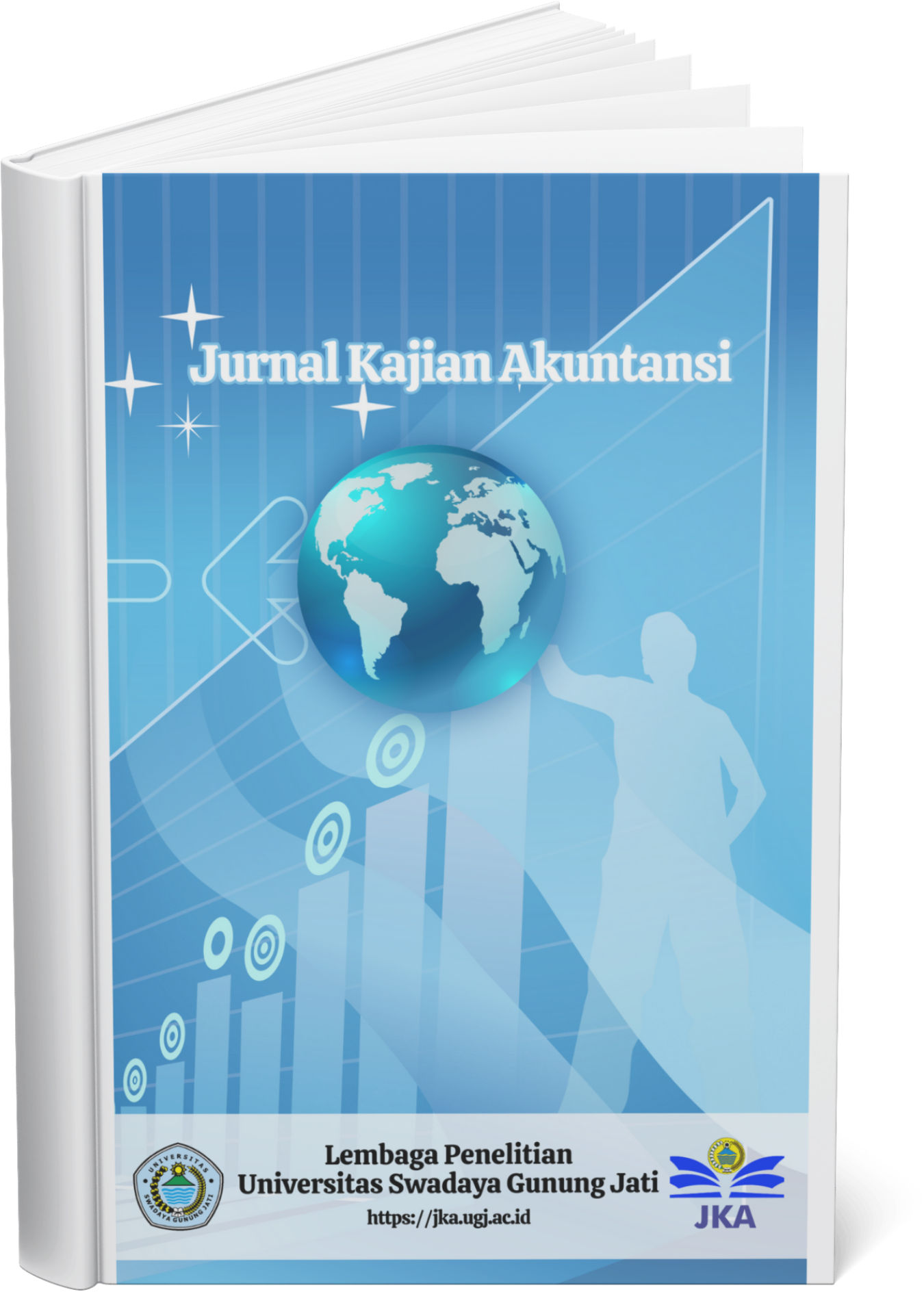Hedonism, Religiosity, and Fraud In Financial Statements
DOI:
https://doi.org/10.33603/jka.v7i1.7667Abstract
Abstract
This research is an exploratory - qualitative research with an interpretive phenomenological approach that aims to find hidden meanings from the attitudes, thoughts and behavior of parties related to the existence of corporate financial statements, namely managers, internal auditors and external auditors. The sampling technique used is judgmental sampling with the aim of getting truly competent informants. The research Findings are: First, although in some situations religiosity is ignored or considered less important, religiosity is fundamental factor for individuals who work in the field of accounting as finance manager , internal auditors, and external auditors because religiosity will surely reduce or eliminated chance of fraudulent acts or a creation of false opinions. Second, there are several personal strategies have been carried out by the informants to prevent opportunities for fraud to arise. Third, Accountant are directed to live a simple life, far from a hedonic attitude so their independence and professional integrity will be maintained.
Keywords: Audit; Financial statements; Fraud; Hedonism; Religiosity.
Abstrak
Penelitian ini merupakan penelitian kualitatif eksploratif dengan pendekatan fenomenologis interpretatif yang bertujuan untuk menemukan makna tersembunyi dari sikap, pemikiran dan perilaku para pihak yang terkait dengan keberadaan laporan keuangan perusahaan yaitu manajer, auditor internal, dan auditor eksternal. Teknik sampling yang digunakan adalah judgmental sampling dengan tujuan mendapatkan informan yang benar-benar kompeten untuk menjawab pertanyaan penelitian. Temuan penelitian ini diantaranya adalah: Pertama, meskipun dalam beberapa situasi religiusitas diabaikan atau dianggap kurang penting, religiusitas merupakan faktor fundamental bagi individu yang bekerja di bidang akuntansi sebagai; manajer keuangan, auditor internal, dan auditor eksternal, karena religiusitas dapat mengurangi atau menghilangkan peluang munculnya tindakan curang atau pembuatan opini palsu. Kedua, terdapat beberapa strategi pribadi yang dilakukan oleh para informan untuk mencegah munculnya peluang terjadinya kecurangan. Ketiga, akuntan diarahkan untuk hidup sederhana, jauh dari sikap hedonis sehingga independensi dan integritas profesionalnya tetap terjaga.
Kata Kunci: Audit, Hedonisme; Kecurangan; Laporan keuangan; Religiusitas.
References
Abayomi, S. O., & Abayomi, S. O. (2016). Personal Ethics And Fraudster Motivation: The Missing Link In Fraud Triangle And Fraud Diamond Theories. International Journal Of Academic Research In Business And Social Sciences, 6(2), 159–165. https://doi.org/10.6007/ijarbss/v6-i2/2020.
Achmad, T., Ghozali, I., & Pamungkas, I. D. (2022). Hexagon Fraud: Detection Of Fraudulent Financial Reporting In State-Owned Enterprises Indonesia. Economies, 10(1), 1–16. https://doi.org/10.3390/economies10010013.
Amstrong, P. K. Dan G. (2001). Dasar-Dasar Pemasaran Terj. Prehalindo.
Arens, Alvin A, James K, Loebbecke. (2015). Auditing An Integrated Approach (Seventh). Prentice Hall.
Claire Nee, Mark Buttion, David Shepherd, Dean Blackbourn, S. L. (2018). Article Information : The Psychology Of The Corrupt : Some Preliminary Findings. Journal Of Financial Crime. https://doi.org/https://doi.org/10.1108/jfc-03-2018-0032.
Creswell, J. W. (1998). Qualitative Inquiry And Research Design: Choosing Among Five Traditions. Sage.
Goossen, M., Sevä, I. J., & Larsson, D. (2016). Basic Human Values And White-Collar Crime: Findings From Europe. European Journal Of Criminology, 13(4), 434–452. https://doi.org/10.1177/1477370816633260.
Hamzah, H. (2016). Human Development And Hedonism Culture Challenges : A Review From Islamic Perspective. Academia Journal Uitmt, 5(2), 1–15.
Haryanto, N. O., & Susilawati, C. (2018). Pengaruh Kompetensi, Independensi, Dan Profesionalisme Auditor Internal Terhadap Kualitas Audit. Jurnal Akuntansi Bisnis, 16(2), 171. https://doi.org/10.24167/jab.v16i2.1694.
Haryono, S. (2016). Islamic Values Dalam Pengambilan Keputusan Akuntansi. Inferensi, 10(1), 69. https://doi.org/10.18326/infsl3.v10i1.69-92.
Holdcroft, B. B. (2006). What Is Religiosity. Journal Of Catholic Education, 10(1), 89–103. https://doi.org/10.15365/joce.1001082013.
Ikatan Akuntan Indonesia. (2015). PSAK No.1 Penyajian Laporan Keuangan. Dewan Standar Akuntansi Keuangan, 1, 24.
Irsadunas, I., Afrida, Y., & Khairani, R. (2018). Tinjauan Etika Bisnis Islam Dalam Pengelolaan Corporate Social Responsibility. JEBI (Jurnal Ekonomi Dan Bisnis Islam), 3(2), 145. https://doi.org/10.15548/jebi.v3i2.174.
Istifadah, R. U., & Senjani, Y. P. (2020). Religiosity As The Moderating Effect Of Diamond Fraud And Personal Ethics On Fraud Tendencies. Journal Of Islamic Accounting And Finance Research, 2(1), 91. https://doi.org/10.21580/jiafr.2020.2.1.4712.
Jhon C Mowen, M. M. (2002). Perilaku Konsumsi Terj Edisi 1 Jilid 5. Erlangga.
Kanserina, D., Ekonomi, J. P., & Ekonomi, F. (2015). Perilaku Konsumtif Mahasiswa Jurusan Pendidikan Ekonomi Undiksha 2015. 1.
King, J. E., & Williamson, I. O. (2005). Workplace Religious Expression, Religiosity And Job Satisfaction: Clarifying A Relationship. Journal Of Management, Spirituality And Religion, 2(2), 173–198. https://doi.org/10.1080/14766080509518579.
Koerber, C., & Neck, C. P. (2006). Religion In The Workplace: Implications For Financial Fraud And Organizational Decision Making. Journal Of Management, Spirituality And Religion, 3(4), 305–318. https://doi.org/10.1080/14766080609518636.
Listiati, I. (2018). Pandangan Iman Katolik Terhadap Hedonisme. www.katolisitas.org.
Lukman, H., & Harun, V. (2018). Faktor Yang Mempengaruhi Deteksi Kecurangan Dalam Persepsi Auditor Eksternal Dan Auditor Internal. Jurnal Akuntansi, 22(2), 255. https://doi.org/10.24912/ja.v22i2.351.
Lunenburg, F. C. (2011). Goal-Setting Theory Of Motivation. International Journal Of Management, Business, And Administration, 15(1), 1–6.
Melita Prati, L., Lin, Y., & Bass, K. (2007). Religiosity And Workplace Behavior: A Manifestation Of Emotional Intelligence. Journal Of Management, Spirituality And Religion, 4(2), 138–159. https://doi.org/10.1080/14766080709518655.
Downloads
Published
How to Cite
Issue
Section
License
- Authors retain copyright and grant the journal right of first publication with the work simultaneously licensed under a Creative Commons Attribution-ShareAlike (CC-BY-SA 4.0) that allows others to share the work with an acknowledgment of the work's authorship and initial publication in this journal.
- Authors are able to enter into separate, additional contractual arrangements for the non-exclusive distribution of the journal's published version of the work (e.g., post it to an institutional repository or publish it in a book), with an acknowledgment of its initial publication in this journal.
- Authors are permitted and encouraged to post their work online (e.g., in institutional repositories or on their website) prior to and during the submission process, as it can lead to productive exchanges, as well as earlier and greater citation of published work.
